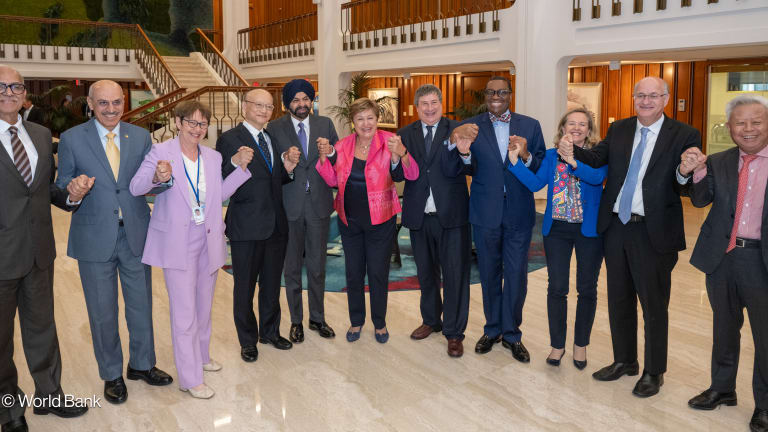To align with Paris, MDBs must move from mainstreaming to transformation

MADRID — The major multilateral development banks are on a mission to align with the Paris climate agreement, and their first objective is to figure out what that means.
Last year at COP24 in Katowice, Poland, the banks collectively agreed to establish a working group to focus on generating some common principles, which they would consider as they try to ensure their financing aligns with global climate goals. On Tuesday in Madrid, representatives involved in that effort shared their progress to date and reflected on some of the challenges these institutions continue to face as they work to adapt their business models and strategies to the urgency of climate action.
“We have to be ambitious, but we have to do it in a way that is politically palatable.”
— Laura Tuck, vice president for sustainable development, World Bank“There were many, many midnight and even post-midnight email exchanges — and even fiery ones on some of the topics,” said Josué Tanaka, managing director for energy efficiency and climate change at the European Bank for Reconstruction and Development.
Devex Senior Reporter Michael Igoe is at COP25 in Madrid. Sign up to our special edition newsletter to receive a wrap-up briefing next Monday.
The banks are working to align with the Paris Agreement in six areas that were laid out in Katowice: mitigation; adaptation and climate-resilient operations; climate finance; engagement and policy development support; transparency and reporting; and internal activities.
Given the significant focus on multilateral development banks’ role in financing — or not — fossil fuel energy projects, the building block related to mitigation has drawn significant scrutiny. Last month’s decision by shareholders at the European Investment Bank to adopt a new energy policy that phases out financing to energy projects based on fossil fuels by the end of 2021 represents the high-water mark for what climate action advocates hope the rest of these institutions might consider.
“We need to focus also on what this policy wants to do, which is [increasing] our efforts in helping to [accelerate] decarbonization,” EIB Vice President Emma Navarro said.
That requires MDBs to “put an emphasis on those projects and operations that we know will have more added value for those objectives,” Navarro said.
Some external observers have made a similar argument. They say it’s fine for the multilateral development banks to talk about all the positive things they are doing on the climate front, but the fundamental question is whether their overall portfolios are leading the world toward decarbonized economies.
“The real end goal is the long-term transformation of the economy,” Ian Cochran, program director at the Institute for Climate Economics, told Devex.
For these institutions, this means driving a top-line message that countries can achieve their economic development goals at the same time that they pursue ambitious climate action.
They have been joined in that effort by a coalition of finance ministers from 51 countries representing 30% of global GDP. On Monday, these ministers launched the Santiago Action Plan, which aims to lay out how they will transition their countries to low-carbon economies. Recognizing that some of these policies can be unpopular and that this makes them difficult to implement, the World Bank wants to help finance ministers think through how to tailor climate policies to the specific political dynamics in their countries.
“There’s a whole class of people who actually can afford some of these policy changes but don’t want to. And they’re quite noisy, and they’re in the streets … What we’re trying to do is come up with different policy options that fit in different contexts depending on the people, the social politics, the governance, the trust, and offer different solutions that work,” said Laura Tuck, vice president for sustainable development at the World Bank.
“We have to be ambitious, but we have to do it in a way that is politically palatable,” Tuck said.
The question of ambition is front and center at COP25, where negotiators are struggling to set the Paris Agreement on a trajectory that has some chance of delivering emissions reductions that can limit climate change to 2 degrees Celsius.
While the MDB working group on Paris alignment has received a generally positive reception for what observers say is a serious effort to create a shared framework for climate action, it still remains to be seen whether some of the banks are willing to shift their development mandates in a truly climate-ambitious direction. To a large extent, that depends less on the institutions themselves and more on the countries that own and govern those institutions.
“I think we need to not focus as much on the institutions,” Cochran said. “We need to focus on their board and their stakeholders.”
According to Cochran, allowing these institutions to take more risk could see them playing a larger role in creating new markets or financing demonstration projects for low-carbon technologies that can prove their viability to the private sector, for example.
“As we think about the post-2020 development finance agenda, how do we move — particularly the big institutions — away from where historically they’ve had their impact, which is direct project finance, to think about how they can have a bit more systemic changes?” he said.
Search for articles
Most Read
- 1
- 2
- 3
- 4
- 5








